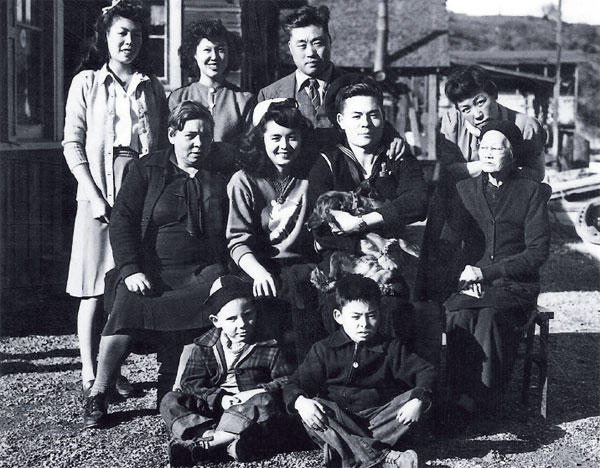Last of the Chinese shrimpers
Updated: 2016-09-09 11:36
By Lia Zhu(China Daily USA)
|
||||||||
He said he was "just"' a fisherman in the last shrimping village on the northern shore of San Francisco Bay. To those who knew him, Frank Quan was a story teller and someone who represented the "living history"' of China Camp Village, Lia Zhu reports from San Francisco.
The sun pokes through the thin clouds on a fresh, warm afternoon. An old man, in a checkered shirt and jeans, strolls along the quiet beach, gazing at the long pier.
That's the image of Frank Quan frozen in the memories of many people. The last resident of the last Chinese shrimping village on the northern shore of San Francisco Bay died on Aug 15, 10 days before he would turn 91.
Born in 1925 in China Camp Village, except for a stint in the US Navy during World Wall II, Quan lived his whole life in the village established by Chinese immigrants.
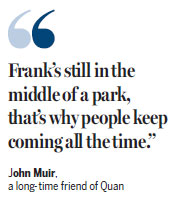
In the middle of China Camp, now a state park, there are a few wooden shacks that were part of Quan's life - a general store and a caf he ran.
"It's bittersweet," said Heidi Kuhn, the daughter of a childhood friend of Quan, who had visited him two days before he was found dead in his bedroom. "Frank told me 'I'm just a fisherman but my life is complete. He was content having told his stories."
Quan never married and had no children, but he had many friends from China and Europe.
"Last month, Frank told me excitedly that he saw some new visitors who had never come here before," said Ed Lai, chairman of Friends of China Camp, a non-profit organization that operates the state park.
Calling Quan a "living history of China Camp", Lai said he played an essential role in preserving the historic village and transforming it into a state park.
One stipulation
The 36-acre village was donated by a developer to the state of California in the late 1970s but with a stipulation: Quan was to have life-long residency in the area as a living memorial to the history of Chinese Americans in the Bay Area.
"Frank's still in the middle of a park, that's why people keep coming all the time," John Muir, a long-time friend of Quan and a board member of Friends of China Camp, told a radio news program years ago.
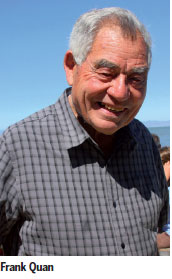
The park faced closure by the state's park department in 2011 because of a lack of funds. Quan helped save it by joining the group's board members, raising money and doing media interviews.
"I saw an elderly lady shed tears at a fundraiser because it reminded her of her childhood moments when her mother took her to buy shrimp at the beach," said Lai.
The group raised more than $300,000 in six months and entered into an agreement with the state parks department to operate the park.
"Now we have around 300,000 visitors a year. More and more visitors from other parts of the US and other countries come because they read the stories of Frank," said Lai.
Living alone in his 80s, without modern equipment and a facility, was not easy for Quan.
"Two years ago, I saw Frank, who was 88 then, working alone on the roof. I often saw him maintaining the buildings and machinery," said Lai. "But I think he was rather happy and comfortable. He had no worries."
"Friends will remember him as a gourmet who loved to share spirits and a great meal in the yard of his home," read Quan's obituary.
Kuhn said she still remembers going to China Camp with her father and ordering a shrimp cocktail when she was a child. Her father, Bob Thomas, three years Quan's junior, went to the same high school with Quan, and the pair remained close friends.
"That was good - the baby shrimps of California," she said.
Quan's friends said he still went shrimping in his last days, and served shrimp salad and clam chowder to visitors in the historic caf on weekends, just like his mother and aunt had done since the 1950s.
|
Frank Quan (third from left, sitting) and his family at China Camp. Courtesy of Friends of China Camp |
His smile
"People from all over the world will remember that," said Kuhn. "They'll remember his smile, the most beautiful welcoming smile."
Like China Camp, there were more than 20 fishing villages around San Francisco and San Pablo bays that flourished in the 19th and 20th centuries, but all of them except China Camp faded away after the passage of anti-Chinese laws and World War II.
Thanks to Frank, the essential community spirit and historic way of life of his family was kept alive.
Frank Quan and others cherished the past and worked hard to preserve the history of the early Chinese in America, said Gordon Chang, a professor of American history at Stanford University and director of the Center for East Asian Studies.
"Because much mainstream historical writing omits their history, it is imperative that we, descendants of the early Chinese, do not," said Chang, who since last year has been leading a Stanford project to preserve the history of the Chinese railroad workers of 150 years ago.
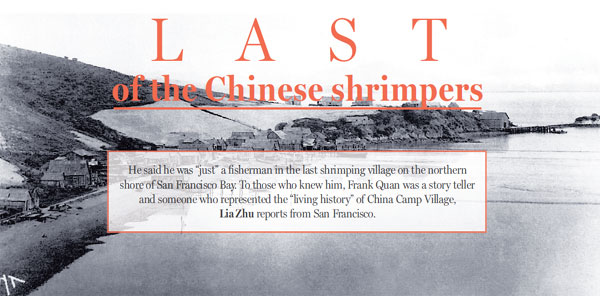
"We also must work to make the lives, experiences, and histories of Frank and others part of mainstream history. Only in this way is it possible for us to find real inclusion and acceptance in America today," he said.
The history of Chinese railroad workers has received considerable attention but the stories of Chinese shrimp fishermen have not yet, said Lai.
"China Camp is more than just a home or a park; it's a witness to the history of Chinese settlers who crossed the ocean, endured hardships and discrimination and survived in the American land," he said. "It's the shared memory of all Chinese Americans."
As the Transcontinental Railroad was completed, Chinese immigrants came to San Francisco looking for work. Many became laborers at the McNear ranch, owned by John A. McNear, the great great grandfather of Kuhn.
They supplemented their income by fishing for shrimp along the shores of San Pablo Bay, setting up temporary camps around the McNear property, which later became the China Camp.
In the 1880s during its heyday, China Camp Village had almost 500 residents and several streets lined with wooden buildings. More than 3 million pounds of shrimp were harvested from the Bay each year, and most was dried and prepared for export to China.
Then vicious anti-Chinese sentiment swept California. To avoid discrimination of the cities, Quan Hung Quock, Frank's grandfather, moved to China Camp from San Francisco's Chinatown in 1895. He built a general store there and raised a family.
Anti-Chinese
Over the next few decades after the passage of the Chinese Exclusion Act in 1882, additional discriminatory laws were passed against the Chinese fishermen, making their life even harder.
The export of shrimp was outlawed in the early 1990s, striking a severe blow to China Camp's economy. Then, the height of shrimping season was closed and the use of traditional bag nets favored by the Chinese was prohibited.
As a result, the population of China Camp Village declined until only one family - the Quans - was left carrying on shrimping in the bay.
"Frank told me he used to go shrimping twice a day, and usually caught hundreds of pounds every time," said Lai.
But after the diversion of river water made the bay too salty for shrimp to thrive, he would be lucky if he could catch one or two pounds, and most of his catch was sold as bait, he said.
Sharing a similar history, China Beach, a small, sandy cove in San Francisco's Sea Cliff area, used to be a camp for Chinese fishermen to anchor their fishing boats because they were not allowed to dock at Fishermen's Wharf.
A large monument with the Chinese characters for "China Beach" inscribed on it was erected in 1982 to honor the Chinese fishermen who had worked in the San Francisco Bay during the wave of anti-Chinese sentiment.
Compared with the Fishermen's Wharf, only five miles away, China Beach is much quieter and less known by the Chinese tourists who flock to the popular attractions such as the Fishermen's Wharf, Golden Gate Bridge and Lombard Street.
"It appeals to a niche market," said Jinyu Qin, product development manager of Tours for Fun, a Los Angeles-based tour agency specializing in customized tours for Chinese tourists.
"Most of the Chinese tourists would like to go to those more well-known sites but I think there is potential for those who are interested in culture and history," she said. "The challenge is how to better present the history and provide docent service."
Lai, who helps in his docent tours with Chinese visitors, said the sudden loss of Quan was a big blow to the park.
"No stories of China Camp will be told anymore," he said, adding that the old man told stories to a group of students from Dominican University only one day before he died.
To honor Quan, Friends of China Camp decided to cancel the celebration of the annual heritage day in August and plans to celebrate his life at the park on Oct 15.
The next question they face is the fate of Quan's home, store and caf.
"Since they are the state's properties, we'll talk with the state park department about how to preserve buildings," Lai said.
The message
To Kuhn, CEO of a non-profit organization called "Roots of Peace", China Camp gave her one message: love and respect people.
"My great grandfather esteemed the contribution of the Chinese people who helped build the Transcontinental Railroad across the US," she said.
Her great-grandfather, who owned thousands of acres of land in east San Rafael at that time, thought the discrimination laws were unfair to the Chinese, and he offered to let them live on his property, charging $1 a year rent, she said.
"That's very affordable, symbolic," said Kuhn. "The Chinese were contributing to the American economy. They became a vital part of the economy of the community."
At a time when the Chinese were made scapegoats for taking away the jobs of Americans, nobody would work with Chinese people, she said.
"My grandfather loved Chinese people. He even learned Chinese to converse with them," said Kuhn. "My father as a young boy helped clean out the storage of the dried shrimp."
"It was so beautiful to see my father walking along the beach with his childhood friend, reminiscing about China Camp, and sharing together stories of healing social injustices," she said.
Contact the writer at liazhu@chinadailyusa.com
Congjiang Wang contributed to this story.
(China Daily USA 09/09/2016 page20)
- Three women planning 'imminent' attacks arrested in France: minister
- China, Britain vow to deepen military exchanges, mutual trust
- Suspected DPRK nuke test casts shadow on THAAD
- British parliament to debate second Brexit referendum petition
- Chinese women find their way through the glass ceiling
- Rousseff leaves presidential residence in salutation

 Sights and sounds of Premier Li's visit to Laos
Sights and sounds of Premier Li's visit to Laos
 Bullet train attendants strut new look in Xi'an
Bullet train attendants strut new look in Xi'an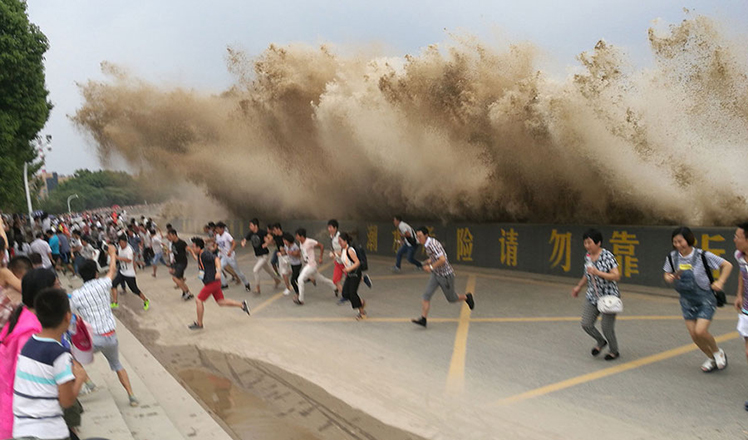
 Ten photos from around China: Sept 2 - 8
Ten photos from around China: Sept 2 - 8
 Turning mud into work of art
Turning mud into work of art
 Unforgettable moments of Premier Li at ASEAN meeting
Unforgettable moments of Premier Li at ASEAN meeting
 Six policy signals China sent at G20 Summit
Six policy signals China sent at G20 Summit
 'First Lady table ware' a hit in Hangzhou
'First Lady table ware' a hit in Hangzhou
 Paralympics opens in Rio
Paralympics opens in Rio
Most Viewed
Editor's Picks

|

|

|

|

|

|
Today's Top News
Trump outlines anti-terror plan, proposing extreme vetting for immigrants
Phelps puts spotlight on cupping
US launches airstrikes against IS targets in Libya's Sirte
Ministry slams US-Korean THAAD deployment
Two police officers shot at protest in Dallas
Abe's blame game reveals his policies failing to get results
Ending wildlife trafficking must be policy priority in Asia
Effects of supply-side reform take time to be seen
US Weekly

|

|
